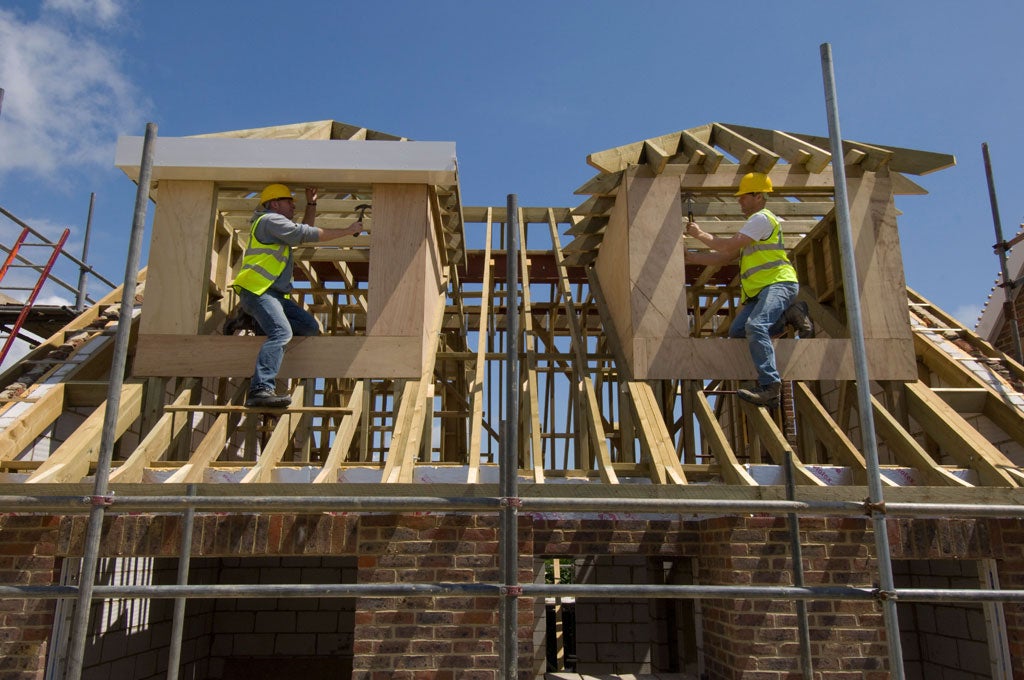Cameron's new housing plan may fail to help buyers
A government scheme launched this week hopes to tempt first-time buyers into newly built homes.

Your support helps us to tell the story
From reproductive rights to climate change to Big Tech, The Independent is on the ground when the story is developing. Whether it's investigating the financials of Elon Musk's pro-Trump PAC or producing our latest documentary, 'The A Word', which shines a light on the American women fighting for reproductive rights, we know how important it is to parse out the facts from the messaging.
At such a critical moment in US history, we need reporters on the ground. Your donation allows us to keep sending journalists to speak to both sides of the story.
The Independent is trusted by Americans across the entire political spectrum. And unlike many other quality news outlets, we choose not to lock Americans out of our reporting and analysis with paywalls. We believe quality journalism should be available to everyone, paid for by those who can afford it.
Your support makes all the difference.The NewBuy Guarantee trumpeted this week by David Cameron as being "a vital boost to the housing market", may be a fillip to homebuilders, but homebuyers have been urged to treat the scheme with caution before signing up.
The scheme offers first-time buyers the chance to get a home with just a five per cent deposit. While such deals were common before the credit crunch, more recently potential buyers have needed to find at least 10 per cent and, more often, 40 per cent deposit, before lenders will even give their applications a sniff.
So what's changed lenders' minds and persuaded the likes of Barclays, Nationwide and NatWest to sign up already? It's simple. Builders and the government have offered lenders security. Housebuilders will put 3.5 per cent of the purchase price into an indemnity fund for each property sold, while the government will provide a 5.5 per cent guarantee.
It means the risk of falling property prices putting the new home owners into negative equity and being unable to afford to sell is minimised. But if builders, lenders and ministers are happy with the scheme, why should borrowers be wary? For starters new-build properties don't often prove to be bargains. Many include a premium on the sale price that can reduce as soon as someone moves into the property. Taking a 95 per cent mortgage on such homes in the past has often proved a financial mistake, although the government guarantee mitigates that.
But there are also the deals offered by lenders. All offered to date are fixed rates. While they can be a good thing in offering borrowers the certainty of knowing how much monthly mortgage repayments will be, what happens when the fixed period ends?
Mark Harris, chief executive of mortgage broker SPF Private Clients warned that two-year fixed rates, in particular, are not a good bet in the current low interest-rate environment when rates are not expected to rise for a couple of years.
"Because borrowers will only have a small deposit, if property prices do fall further over the next couple of years, it could be difficult for them to remortgage again in two years' time when their loan-to-value may have risen above 95 per cent," he said.
There's also the prospect of interest rate rises. While experts don't expect a base rate rise for many months, it will do so eventually. When it does mortgage rates will climb quickly and many first-time buyers, who struggled to afford deals now, could soon find monthly mortgage repayments spiralling out of reach.
But what about the mortgage deals themselves? Are they competitive? Reasonably, according to David Hollingworth of London & Country Mortgages.
"The first batch appears to have ticked the boxes of improving the breadth of policy that the participants will offer and also offering better-rated products," he said.
For example NatWest is offering a two-year fixed rate mortgage at 4.29 per cent while Newcastle Building Society offers a two-year fixed rate in the open market to those with just a 5 per cent deposit at 5.95 per cent.
Will the NewBuy scheme spark a mad rush of buyers back to the market? "Probably not," said Mr Hollingworth. "But it certainly offers some alternative options."
Join our commenting forum
Join thought-provoking conversations, follow other Independent readers and see their replies
Comments